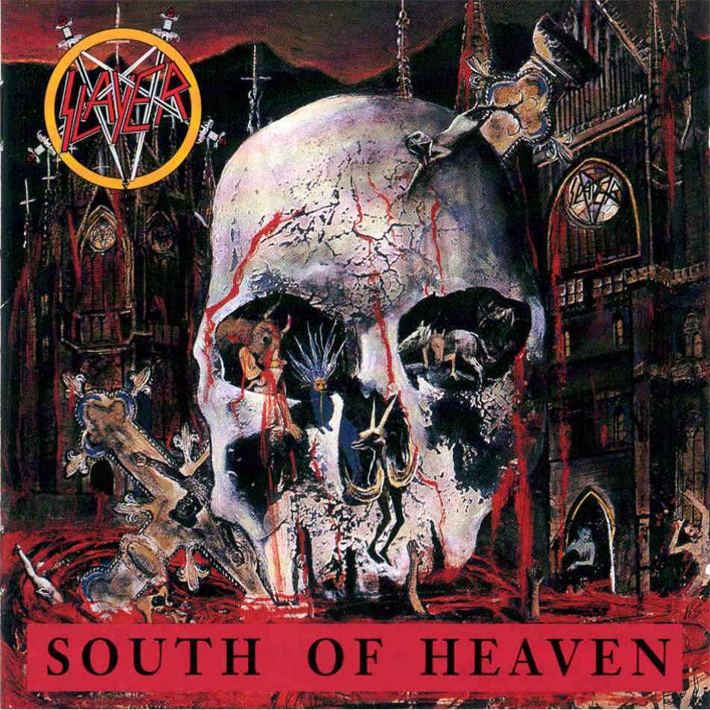Ah Slayer, the mighty Thrash legends. You can’t knock them really can you? Well apart from the fact they’ve been writing the same album over and over again for the past 25 years right? To be fair, wrong. In the band’s defence, Slayer have tried a lot of different approaches with their music, although not always as groundbreaking or successful as 1986’s Reign in Blood, many have been fantastic albums in their own right.
Read on to see what I make of Slayer’s South of Heaven, released in 1988.
Slayer – South of Heaven (1988)
After the huge success of Reign in Blood, Slayer had two options; they could rehash Reign in Blood, or they could try something a little different. Slayer opted for the latter, going as far as completely slowing down the music in comparison to Reign in Blood. South of Heaven also proves to be a much more melodic effort; as melodic as Slayer gets anyways. After all, this is the band who’s guitarist (Kerry King) has been quoted as saying he doesn’t like melody.
Opening track, South of Heaven is a Slayer classic known by all the fans. The track is slow, but still retains that classic Slayer heaviness. South of Heaven is slow and moody, and the dark intro riff is instantly recognisable. It’s as if the opening fits right in after Raining Blood, even the riff is reminiscent of that song, but it’s a lot slower and lot darker. Tom Araya’s vocals are also fantastic (well, as “fantastic” as Tom Araya gets, which isn’t very) during this song, from the murky singing to the heavier screams. Once the song picks up the pace, it’s an absolute beast of a song and presents Slayer at their absolute best.
Lyrically, Slayer is as dark as any of their efforts, again offering a morbid and wicked narration to the equally bleak instrumentation. Slayer build on their satanic themes they are known for, but incorporate more emphasis on war this time. The sinister Mandatory Suicide is a particular highlight of the album with Araya making use of a much more melodic approach to his vocals. The song is catchy, but without sacrificing any of the elements that make Slayer, well Slayer.
Ghosts of War brings back the heaviness, and that classic Slayer sound with it. Araya’s vocals are less melodic and much more like the shouting and signature screaming he is known for. This continues with the seventh track, Read Between the Lies, another good song on the album. The only complaint in my opinion is that Araya’s vocals are a little lacklustre on occasions.
Near the end of South of Heaven, Slayer present the most melodic song on the album, and that’s because it’s a Judas Priest cover. Dissident Aggressor is the only cover Slayer have ever featured on a studio album, and what a great cover it is. Slayer do a great job covering the Priest, but still manage to incorporate their own Slayer twist to the song. Slayer without a doubt do the song great justice, despite the fact vocally Rob Halford shits all over Araya, which frankly, isn’t hard. Even my pet dog shits all over Araya as a vocalist.
The final track, Spill the Blood begins with an excellent creepy clean introduction guitar line, before blasting into the song. The song is tremendous, and menacing, making it a fitting end to the album. Tom Araya again makes use of much more melodic vocals. For the most part, they work, but personally I am more of a fan of his less melodic vocal work. Instrumentally though, you can’t really fault the track, but at nearly 5 minutes, the song does out stay its welcome, just a bit.
Overall, South of Heaven, is at times slightly hit and miss. Regardless, the hits definitely outweigh the misses, and South of Heaven presents itself as another fantastic and at times underrated Slayer album. If you fancy hearing something a bit different or slower from the band, then give South of Heaven a listen.
Final Verdict: A great underrated album from Thrash titans, Slayer.
8.5/10

